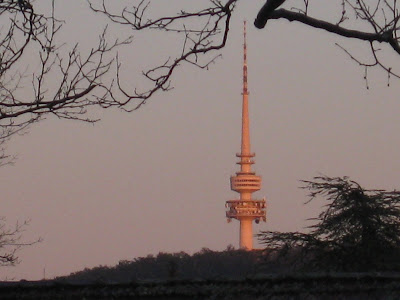 |
| Man and Nature: Telecom tower in the red light of a Canberra winter's dawn. |
At the end of my first Ramadan Hebbat took me to the Mosque. This is the tradition in Muslim families: after the last day of fasting comes Eid - the holiday that marks the first day of non-fasting. The custom holds that everyone goes to the mosque for the morning prayer and to offer their pledge to charity for the year. After the praying is done and the poor are taken care of, the real celebrations can begin.
It was a beautiful clear morning as we caught the metro to Place Monge, and making our way down to La Grand Mosquée de Paris, we saw the crowds were already apparent. At the doors, Hebbat and I had to go separate ways as males and females pray in different parts of the building. On my own I did my best to blend in, and even though my ignorance made me stick out like a sore thumb, everyone was very kind and welcoming. I didn't feel uncomfortable, in perhaps a slightly presumptuous way I felt that after 4 weeks of fasting, I'd earned my place there just as much as the next man. And despite our cultural differences there was a strong feeling of fraternity. Looking into the eyes of the faithful surrounding me, I saw my relief echoed: finally after such a ordeal we could all go back to living normally!
After a long introduction that gave everyone time to find a spot to kneel, the sermon began. It went for about 30 minutes, and as with the rest of the proceedings, I didn't understand a scrap. Everything was in Arabic, and as I didn't have Hebbat nearby to translate, I contented myself with following along blindly, doing my best to bow my head when everyone else did.
Afterward with the greatest of joys Hebbat and I went to a nearby café. Finding a nice table in the sun, we sat down and ordered croissants and hot chocolates. After 30 days of self-imposed restraint, we marvelled at the simple pleasure of being able to eat whenever we wanted. After they arrived, we toasted our drinks and reminisced momentarily about the incredible adventure that now lay behind us. Our relief buoyed our spirits just as the delicious hot chocolates and croissants nourished our bodies: we had done it!
Curious about the incomprehensible sermon that had passed over my head I asked Hebbat what had been said.
"Well it was a bit dissapointing," she began, "because sometimes the sermons are really inspiring, but this year it was just the same kinds of things they always say."
"And what kinds of things do they say?", I persisted, not really knowing what to expect.
"Oh, you know, just peace and love, be kind to your neighbours and be good to your families in the year to come, you know, that kind of thing."
"Really?" I replied, shocked.
The strange thing was, whatever I had imagined they were saying, it was certainly a long way from 'peace' and 'love'. I'm not saying that I thought the Imam was laying out the next plan for aggressive Islamic takeover, but I did realise just how much I had been swayed by my cultural prejudices. It seemed quite incredible that coded in all those guttural and abrupt sounding Arabic utterances was essentially the same message preached in any english church at Christmas.
I shook my head at my own belligerence and then smiled: I might just as bad as the next white australian xenophobe, but it was heartening to think that even after it was over, Ramadan still had a few things to teach me.